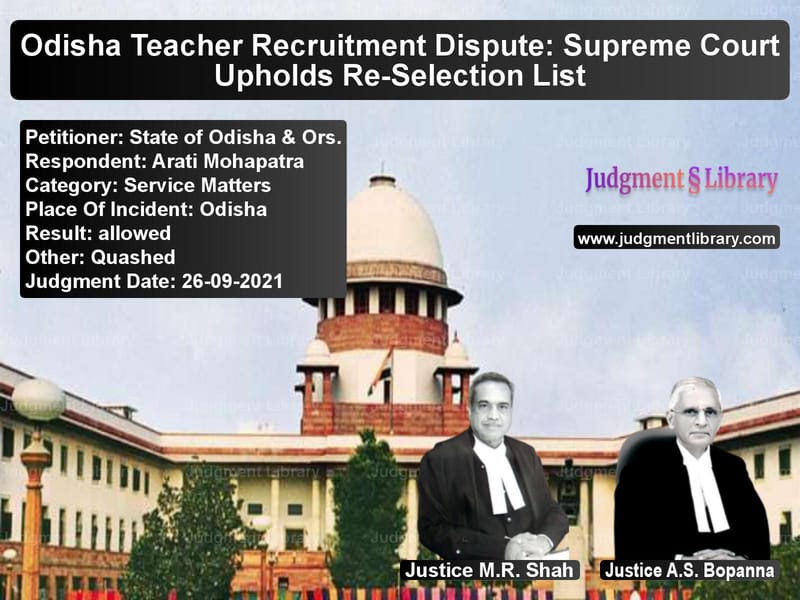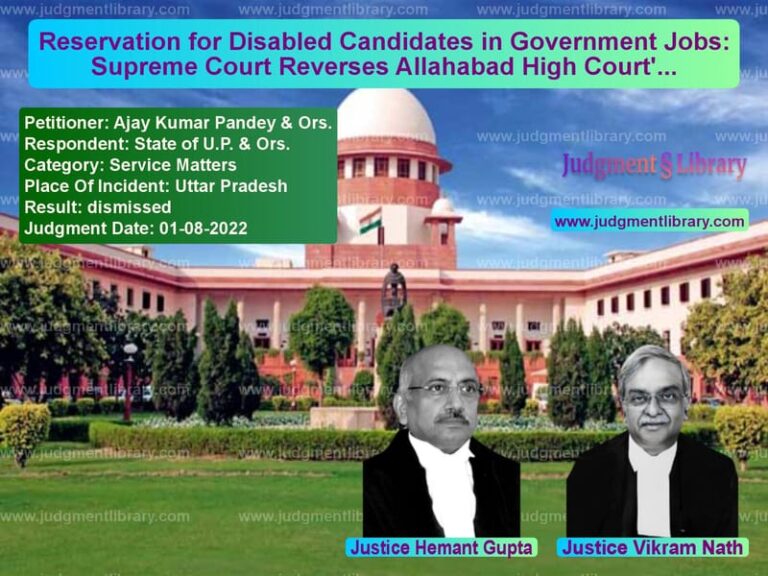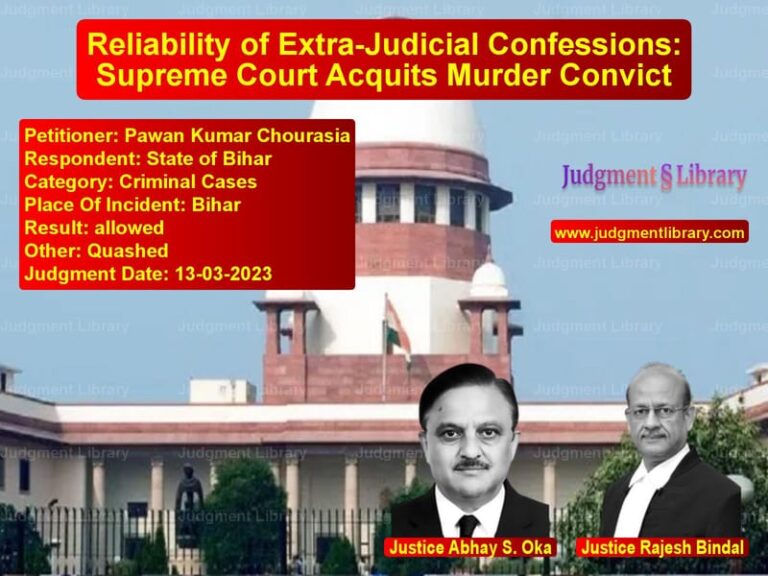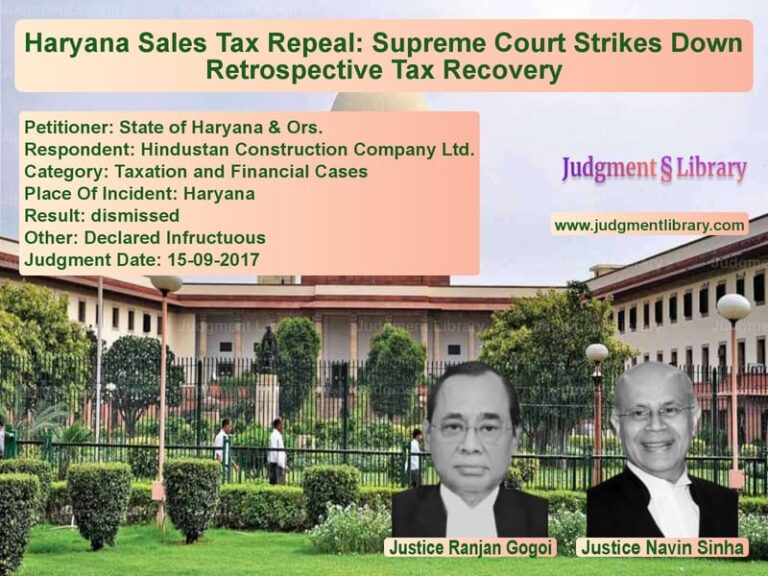Odisha Teacher Recruitment Dispute: Supreme Court Upholds Re-Selection List
The case of State of Odisha & Ors. v. Arati Mohapatra revolves around a long-standing dispute concerning the recruitment of primary school teachers in Odisha. The Supreme Court was called upon to determine whether the re-selection process initiated by the State, which resulted in the respondent’s removal from service, was justified. Ultimately, the Supreme Court ruled in favor of the State of Odisha, setting aside the High Court’s ruling that had reinstated the respondent.
Background of the Case
The dispute began with the recruitment process initiated in 1996 for primary school teachers in Odisha. The case timeline is as follows:
- In March 1996, the government formulated a procedure for recruitment, and the selection process commenced.
- On January 31, 1997, a list of 379 candidates selected for appointment was published, including the respondent, Arati Mohapatra, who was ranked at serial number 301 with a score of 114.80 marks.
- The respondent was appointed as an Assistant Teacher at Singiri and joined service on July 30, 1997.
- A group of unsuccessful candidates challenged the selection process before the Odisha State Administrative Tribunal (SAT), alleging irregularities.
- On January 24, 2001, the SAT directed the authorities to prepare a fresh selection list.
- After continued litigation, the State complied with the tribunal’s order and published a new list on December 15, 2004, leading to the withdrawal of previous appointments.
- Upon reevaluation, the respondent’s revised score was 109.86 marks, which was below the cutoff of 111.53 marks for the general category.
- Consequently, she was removed from service on November 30, 2006.
The respondent challenged her removal before the State Administrative Tribunal in O.A. No. 2699(C)/2006, which upheld the termination.
Respondent’s Challenge Before the High Court
The respondent then approached the High Court of Orissa, contending that:
- The revised selection list incorrectly reduced her marks.
- The re-selection process was arbitrary and violated her rights.
- She should be reinstated based on her original score of 114.80 marks, which was obtained through an RTI request.
The High Court ruled in her favor, relying on the RTI data showing that she had initially been awarded 114.80 marks.
State’s Appeal Before the Supreme Court
The State of Odisha challenged the High Court’s decision, arguing:
- The initial selection process was flawed and was rightly set aside by the tribunal.
- The re-selection process was based on accurate calculations and followed proper procedures.
- The RTI-obtained marks pertained to the original, invalidated list and could not be relied upon.
Supreme Court’s Observations
The Supreme Court noted that:
- The High Court’s reliance on the RTI data was misplaced as the original list had been nullified.
- The respondent’s final score of 109.86 marks, as per the re-selection process, was below the cutoff.
- The State had complied with legal requirements by revising the selection process.
- “A selection process, once found to be flawed, must be rectified in accordance with legal mandates, and reliance on prior, invalid lists is improper.”
Supreme Court’s Judgment
The Supreme Court ruled in favor of the State of Odisha, holding that:
- The High Court’s order reinstating the respondent was set aside.
- The re-selection process was valid and had been conducted lawfully.
- The respondent’s removal from service was justified.
Key Takeaways from the Judgment
- Re-selection Processes Must Be Respected: Once a selection process is found to be flawed, a revised process takes precedence.
- RTI Data Cannot Override Tribunal Orders: Information obtained through RTI does not hold legal weight if it pertains to an invalidated process.
- Judicial Scrutiny Must Be Based on Legally Valid Documents: Courts should not rely on previous records once a new, legally valid list is established.
- Finality in Employment Decisions: Government employment decisions must be based on transparent and legal procedures.
- Tribunal and High Court Powers: While tribunals can correct administrative errors, High Courts must ensure they do not overturn justified corrective measures.
Conclusion
The Supreme Court’s ruling in State of Odisha v. Arati Mohapatra establishes an important precedent on the validity of re-selection processes in public employment. It reinforces that recruitment procedures must be corrected when irregularities are found and that courts should respect legally validated re-selection lists rather than rely on superseded data. The ruling upholds fairness in public employment while ensuring compliance with due process.
Petitioner Name: State of Odisha & Ors..Respondent Name: Arati Mohapatra.Judgment By: Justice M.R. Shah, Justice A.S. Bopanna.Place Of Incident: Odisha.Judgment Date: 26-09-2021.
Don’t miss out on the full details! Download the complete judgment in PDF format below and gain valuable insights instantly!
Download Judgment: state-of-odisha-&-or-vs-arati-mohapatra-supreme-court-of-india-judgment-dated-26-09-2021.pdf
Directly Download Judgment: Directly download this Judgment
See all petitions in Recruitment Policies
See all petitions in Public Sector Employees
See all petitions in Employment Disputes
See all petitions in Judgment by Mukeshkumar Rasikbhai Shah
See all petitions in Judgment by A. S. Bopanna
See all petitions in allowed
See all petitions in Quashed
See all petitions in supreme court of India judgments September 2021
See all petitions in 2021 judgments
See all posts in Service Matters Category
See all allowed petitions in Service Matters Category
See all Dismissed petitions in Service Matters Category
See all partially allowed petitions in Service Matters Category







